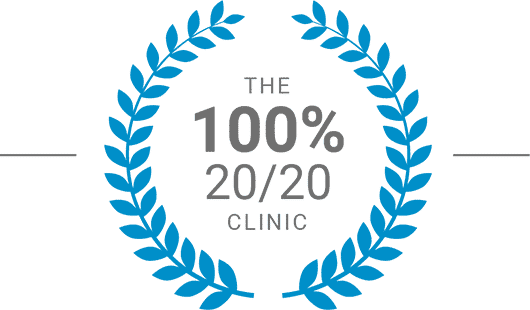Book Your Free Consultation
Mr David Allamby
MD, FRCOphth, FRCS
If you or a loved one is going to undergo cataract surgery, it’s understandable if you want to know more about the recovery period.
Cataract surgery is a straightforward surgical procedure that only lasts around 10 to 15 minutes. Most patients are ready to go home within an hour or two of the operation. But there is a little more to think about.
Here’s what to expect after cataract surgery, from timescales to ensuring your recovery is problem-free.
Your eyes may look slightly red and bruised, but this is normal. It should disappear after a few days.
Immediately after the surgery, you will need to rest in the cataract surgery clinic’s recovery area until you’re less groggy from the sedation. This typically takes between 30 minutes to an hour.
Coming alone?
Keep in mind that the local anaesthetic can take several hours to begin wearing off and before feeling starts to return to your eyes. So, it’s advised that you have someone who can drive you home.
You’ll have a protective eye shield and be given a pair of sunglasses to wear to protect your eyes from bright lights and glare.
Once you get home, rest your eyes and nap to help them heal.
Some people report clear vision within a few hours after cataract surgery. But each patient heals differently and it can take you around a week or two before you experience this.
After a few hours, you may be able to watch TV or look at a screen (such as a computer or tablet) for a short period of time.
Depending on your surgeon’s advice, you might be able to remove the protective eye shield several hours after the cataract procedure.
Don’t panic if your vision appears cloudy or distorted – it can take time for your body to adjust to the new implant lens that replaced your eye’s natural lens.
Some patients have even reported experiencing “wavy” vision. If you do have this, it should only last around an hour.
You might also have bloodshot eyes. This is due to the blood vessels on the surface of the “whites” of your eyes being temporarily damaged.
As your eyes heal, this redness will also die down – usually within several days.
Your eyes may feel itchy, gritty or dry. You may also have a mild headache and lights may seem very bright.
This is normal and not a cause of concern. Keep using your lubricating eye drops and wear your eye shield at night.
If you had red, bloodshot or bruised eyes, this should be improving. Your vision should be much better than it was immediately after the surgery.
However, your near vision might not be as clear as your distance vision.
One to two days after the surgery, you should be able to perform basic daily activities such as getting out of bed, getting dressed and even gentle exercises. You can read and watch TV, and most people can return to work.
Three to seven days after the surgery, you’ll be able to resume all of your normal activities and gentle exercises except for swimming.
You should be able to return to work and as soon as you meet the DVLA standard, you can resume driving.
Summary of the Symptoms During the First Week After Surgery
After 10 to 14 days, your eyes should have largely healed and you should be able to resume your normal daily routine, although swimming isn’t recommended yet. Your vision will be checked and you’ll be given a final prescription.
At this point, you may be measured for new glasses, depending on how much you’ve healed and whether your vision has stabilised.
You might be wondering, “Wait what? Glasses?”
Regardless of the type of cataract surgery, if you had standard monofocal implants, most people will still require a type of glasses, such as those for reading or computer screens.
The exception is if you elected to have premium multifocal implants that restore both far and close vision, as well as at computer range.
These lenses (IOLs) are not available in the NHS due to their cost, but are commonly used in private surgery.
Some people might have even healed after two weeks. But don’t worry if your eyes haven’t yet.
Remember that everyone is different and it can take between two to six weeks to make a full recovery from cataract surgery.
At the four week mark, you should have completed your course of eye drops. Your eyes will start to look normal again with signs of redness and bruising disappearing.
Your vision will also be far better than it was before and immediately after your operation. If you weren’t ready to have your eyes measured earlier, you should be now.
If you weren’t able to drive earlier, you should be able to do so – as long as you have no other reason for not meeting the DVLA standard.
You should also be allowed to swim safely again, but double check with your surgeon.
Six weeks after the surgery, you should be safe to return to all sports activities. But make sure you consult with your surgeon before you resume any contacts sports, like martial arts or rugby.
When it comes to eye surgeries, it’s natural to be cautious and wonder whether procedures like cataract surgery are safe.
You can be reassured that modern cataract surgery with an expert surgeon is a safe and effective operation that can correct vision. Serious complications are rare and the success rates are very high.
If you want to ensure that your operation and path to recovery is short and smooth, it’s important you find the right cataract surgeon and clinic.
There are several things you should look out for, including:
Cataract surgery is a straightforward procedure, typically lasting between 10 to 15 minutes. Recovery is usually quick and uncomplicated, with most people experiencing good vision within 48 hours and being fully healed within six weeks.
But, the speed at which you heal can depend on a variety of factors, with age being a major one.
Studies have found that in the very elderly population, visual acuity after cataract surgery tends to be lower than in younger people. For example, a study published in the British Medical Journal found more than a third of the participants aged 85 or older were up to three times more likely to experience severe impairment in one eye than younger people.
This is largely due to the healing rate and the likelihood of other eye conditions developing or already existing being much higher. In other words, the older you are, the more likely you are to have pre-existing eye conditions (such as advanced presbyopia) and the slower your body will heal in comparison to younger people.
The body tends to heal more slowly with age. Studies have suggested that this is due to the body’s ability to send immune signals to heal wounds being slower.
This can be applied to cataract surgery recovery time.
Although the cataract surgery procedure follows a minimal keyhole approach and leaves very tiny incisions, the body still needs to send signals to the cells in order for them heal.
Additionally, the eyes of an elderly patient are more likely to have experienced a higher degree of wear and tear than a younger one.
They are more likely to have sustained various stages of eye trauma over the course of their lifetime, whether it’s from rubbing their eyes, dry eye disease or from years of working.
This can make the eyes more delicate which too can affect healing rate.
Performing cataract surgery on eyes with pre-existing conditions is often difficult and there can be an increased risk of complications developing.
The most common pre-existing problem is dry eye disease.
Dry eyes are often under-diagnosed but amenable to treatment. The degree of dry eye symptoms and how it affects vision are essential factors.
Recent research (2017) found that “patient-reported visual functioning, dry eye symptoms, and health anxiety are more closely associated with patients’ postoperative satisfaction than with the objective clinical measures of visual acuity or the signs of dry eye.”
As another example, cataract surgery on a patient with advanced myopia can increase the risk of retinal detachment, which is a serious complication.
What about glaucoma?
It’s possible to carry out cataract surgery on someone with glaucoma but again, there’s a higher risk of complications.
In addition, some types of intraocular lens (IOLs) may not be suitable if you have advanced glaucoma as it can cause issues like sensitivity to glare.
Due to the higher risk of complications, the recovery time for people with pre-existing eye conditions can be longer.
They often have to be more cautious while in recovery. And if complications do develop, this can obviously slow down recovery even further.
Fortunately, the majority of serious complications can be treated quickly and easily before they advance with medication or corrective surgery.
Although cataract surgery recovery time varies according to different ages, that doesn’t mean older people will always take longer to heal than younger.
It depends on the individual as everyone’s bodies heal at different rates. That’s why age isn’t necessarily the factor that will affect the outcome of your surgery.
In fact, the oldest cataract surgery patient had the operation at 109 years old – and it was successful.
So what else can affect the recovery time?
One important factor is how advanced your cataracts are. For most people, if cataracts are left untreated, they will merely continue to get worse over time.
This will continually reduce vision, preventing them from carrying out normal everyday tasks like driving and can even cause total blindness.
If cataracts get to this stage (also known as being “hyper-mature”), it can make them even more difficult to remove and more likely to lead to post-surgery complications.
As a rule, cataract surgery should be performed soon after vision issues appear, as opposed to waiting months or even years.
Book a FREE* Consultation
To get a better idea of how we can help you, and also the different types of services we offer, book a consultation now.

100% 20/20 vision
Focus Clinic has a remarkable 100% success rate for 20/20 vision. We know of no other clinic that has matched these results. There is a big difference between, for example, 98% and 100% success, especially if you are in the 2%.

10 year guarantee
Your 10 Year Guarantee means you can return at any time if you have additional questions on the quality of your vision. If you have distance vision correction for short-sight then any repeat laser eye treatments to correct a return of myopia in the first 10 years are included free of charge.*

Most trusted eye treatment clinic
We have the highest trust rating of any ‘eye treatment’ rated clinic, according to independent review site TrustPilot. With an outstanding 9.9 out of 10, when it comes to your eyes, choose the clinic that actual patients trust the most.
*Terms and conditions apply, excludes any age-related changes and conditions unrelated to the primary treatment